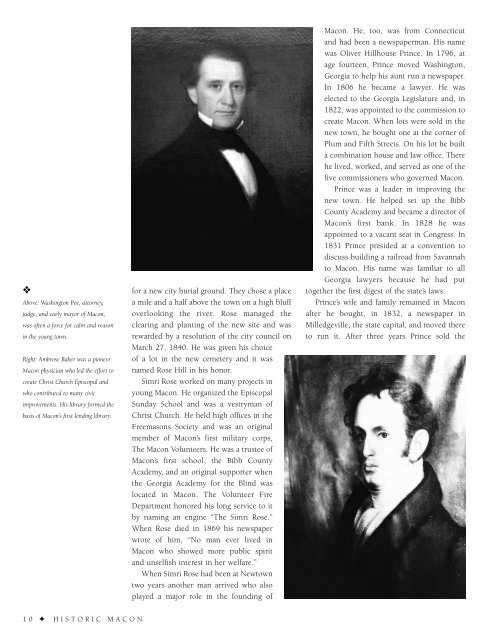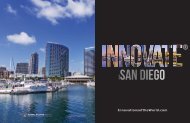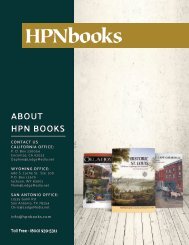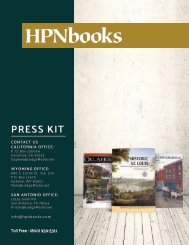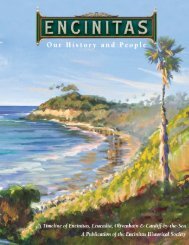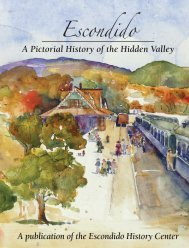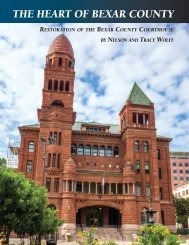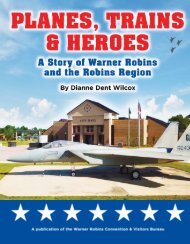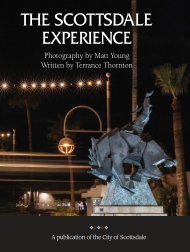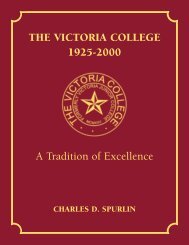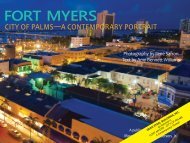Historic Macon
An illustrated history of the city of Macon, paired with the histories of companies, families and organizations that make the region great.
An illustrated history of the city of Macon, paired with the histories of companies, families and organizations that make the region great.
You also want an ePaper? Increase the reach of your titles
YUMPU automatically turns print PDFs into web optimized ePapers that Google loves.
❖<br />
Above: Washington Poe, attorney,<br />
judge, and early mayor of <strong>Macon</strong>,<br />
was often a force for calm and reason<br />
in the young town.<br />
Right: Ambrose Baber was a pioneer<br />
<strong>Macon</strong> physician who led the effort to<br />
create Christ Church Episcopal and<br />
who contributed to many civic<br />
improvements. His library formed the<br />
basis of <strong>Macon</strong>’s first lending library.<br />
for a new city burial ground. They chose a place<br />
a mile and a half above the town on a high bluff<br />
overlooking the river. Rose managed the<br />
clearing and planting of the new site and was<br />
rewarded by a resolution of the city council on<br />
March 27, 1840. He was given his choice<br />
of a lot in the new cemetery and it was<br />
named Rose Hill in his honor.<br />
Simri Rose worked on many projects in<br />
young <strong>Macon</strong>. He organized the Episcopal<br />
Sunday School and was a vestryman of<br />
Christ Church. He held high offices in the<br />
Freemasons Society and was an original<br />
member of <strong>Macon</strong>’s first military corps,<br />
The <strong>Macon</strong> Volunteers. He was a trustee of<br />
<strong>Macon</strong>’s first school, the Bibb County<br />
Academy, and an original supporter when<br />
the Georgia Academy for the Blind was<br />
located in <strong>Macon</strong>. The Volunteer Fire<br />
Department honored his long service to it<br />
by naming an engine “The Simri Rose.”<br />
When Rose died in 1869 his newspaper<br />
wrote of him, “No man ever lived in<br />
<strong>Macon</strong> who showed more public spirit<br />
and unselfish interest in her welfare.”<br />
When Simri Rose had been at Newtown<br />
two years another man arrived who also<br />
played a major role in the founding of<br />
<strong>Macon</strong>. He, too, was from Connecticut<br />
and had been a newspaperman. His name<br />
was Oliver Hillhouse Prince. In 1796, at<br />
age fourteen, Prince moved Washington,<br />
Georgia to help his aunt run a newspaper.<br />
In 1806 he became a lawyer. He was<br />
elected to the Georgia Legislature and, in<br />
1822, was appointed to the commission to<br />
create <strong>Macon</strong>. When lots were sold in the<br />
new town, he bought one at the corner of<br />
Plum and Fifth Streets. On his lot he built<br />
a combination house and law office. There<br />
he lived, worked, and served as one of the<br />
five commissioners who governed <strong>Macon</strong>.<br />
Prince was a leader in improving the<br />
new town. He helped set up the Bibb<br />
County Academy and became a director of<br />
<strong>Macon</strong>’s first bank. In 1828 he was<br />
appointed to a vacant seat in Congress. In<br />
1831 Prince presided at a convention to<br />
discuss building a railroad from Savannah<br />
to <strong>Macon</strong>. His name was familiar to all<br />
Georgia lawyers because he had put<br />
together the first digest of the state’s laws.<br />
Prince’s wife and family remained in <strong>Macon</strong><br />
after he bought, in 1832, a newspaper in<br />
Milledgeville, the state capital, and moved there<br />
to run it. After three years Prince sold the<br />
10 ✦ HISTORIC MACON


